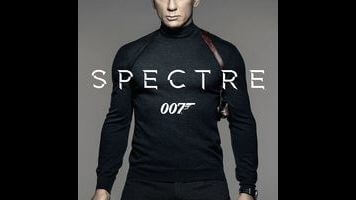Spectre is the most traditional—and uneven—of the recent Bond films

There’s an unexpected undercurrent of tragedy to the recent James Bond movies, the ones starring narrow-faced, blue-eyed brute Daniel Craig. Looked at one way, and in succession, they’re as bleak as Breaking Bad in their depiction of evaporating humanity: Across the sublime spy games of Casino Royale, the Bourne-biting action of Quantum Of Solace, and the sleekly seductive spectacle of Skyfall, a tortured wrecking ball of British intelligence loses his true love, his mentor, and his ability to feel. Each new movie inches him closer to Ian Fleming’s original conception of the ladykiller with a license to kill—which is to say, further away from the comparably compassionate superspy that Craig embodied in his first outing. The more he resembles the Bond of legend, the further gone he looks.
That’s perhaps more pathology than one could have reasonably expected from cinema’s longest-running espionage series, so it’s no great travesty that Spectre, Craig’s fourth and maybe final turn in the tux, doesn’t take the character in any brave new directions or double down on his melancholy. Though it technically picks up where Skyfall left off, continuing the extended origin story of the previous three installments, the film feels more like a back-to-basics exercise—a throwback pastiche stretched out to an overlong 148 minutes, with some revisionist pop psychology thrown in for good measure. For those who have been waiting patiently for Bond to stop brooding so heavily, Spectre is about as close as the Craig version of the character is probably going to get to the quipping, unflappable 007 of yore—though he’s still more likely to burst through a wall than to sweet talk his way into the room on the other side of it.
Bond himself may be fully formed, but that doesn’t mean—in this age of perpetual prequels—that there’s no more backstory to disclose. Spectre reboots another pillar of the franchise mythology: the titular terror organization, a global network of supervillains last seen in 1971’s Diamonds Are Forever. This criminal syndicate, which holds secret meetings led by a shadow-drenched puppet master (Christoph Waltz), isn’t Bond’s only problem. He has also to contend with a new automated global security program, run by a smug tyrant (Andrew Scott) with plans to shut down M (Ralph Fiennes) and his outdated, analog approach to national crises. Besides allowing for another round of winks at the obsolescence of the Bond brand, this particular plot point permits Spectre to draw some curious ideological lines, condemning drone warfare and government surveillance while waxing nostalgic about the good ol’ days of Cold War assassination plots.
For all its international wanderings, the Bond series has never been about geopolitics. It’s about cars and clothes, guns and girls—and to those ends, Sam Mendes remains an ideal handler for this 21st-century iteration of the character. Probably the most acclaimed and high-profile director the franchise has ever landed, Mendes remains valuable perhaps chiefly for his refined taste in collaborators. (There’s an argument to be made that his Oscar-winning first feature, American Beauty, is more a “film by Thomas Newman and Conrad Hall.”) Spectre, like his earlier Skyfall, is flush with cosmetic pleasures, from its fleet of modern and vintage vehicles to its grand wardrobe of suits to the spectacular range of scenic backdrops. The showroom sheen applies to the casting, too: To match Craig’s chiseled appeal—his is surely the most camera-ogled Bond body of them all—Mendes casts two of the most beautiful actresses in the world, though Monica Bellucci has much less to do than Léa Seydoux, whose gun-proficient doctor proves a marginally more proactive Bond girl. (Marginally, because Rebecca Ferguson raised that bar higher in this summer’s Mission: Impossible sequel.)
Mendes fares well with the set pieces, too. The Mexico City prologue finds a costumed Craig winding his way through a teeming Day Of The Dead parade, accompanying some random knockout to her chambers, and then casually finding a view to a kill from the balconies outside—all in one winding, sustained take. Spectre never tops this spectacular cold open, but it makes a couple of valiant efforts: There’s a playful high-speed pursuit down the narrow allies of nighttime Rome, Bond testing his custom ride while long-distance flirting with Moneypenny (Naomie Harris), and a knock-down, drag-out fist fight with a Jaws-like henchman (Dave Bautista, of Guardians Of The Galaxy fame) aboard a speeding train. At times, Mendes just seems to be playing the 007 hits, sending Bond through an Olympics of familiar scenarios.
What Spectre lacks is the sinister magnetic pull of Skyfall, a Bond movie with real stakes and attitude and distinctive flavor, not to mention more mesmeric images than one can usually expect from this workmanlike blockbuster franchise. (Roger Deakins is a tough act to follow, even for a cinematographer as accomplished as Interstellar shooter Hoyte Van Hoytema.) The movie bends over backwards to connect itself to the unofficial trilogy it follows, teasing a sequel-uniting retcon in the passable opening credits sequence. But those films, even the clunky Quantum, had a more palpable sense of danger. For all the talk of its scary global reach, Spectre itself comes across as just another collective of disposable goons. And despite having been born to play a Bond villain, Waltz never comes within striking distance of the volcanic menace of Javier Bardem’s Skyfall heavy; perhaps the former has done the false-civility thing too many times for it to land anymore. Like most of Spectre, he’s not quite old, not quite new, and not quite distinct enough to shake (or stir) this sequel out of second-tier Bond lethargy.